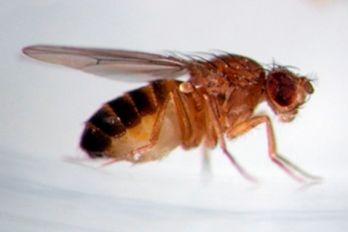Ferment fly
Ferment flies (Drosophila), also known as vinegar flies, are sometimes mistaken for fruit flies. They belong to the family Drosophilidae and are a common nuisance pest.
Background
Ferment flies are small, slow-flying insects found with over-ripened fruit and vegetables.
They are most abundant in the late summer months when tomatoes, apples, and other fruit ripen and begin to ferment.
Impacts
Vinegar flies impose on restaurants, grocery stores, fruit markets, homes, and other locations that contain fermenting or rotting vegetative matter. They spread quickly if not controlled.
Management
Elimination of fly breeding sites is paramount. Although insecticidal fogs and sprays will kill adult vinegar flies, the larvae continue to develop, and new flies will emerge unless potential food sources are removed.
In growing areas, gather and dispose of fruit such as apples, pears and tomatoes that have fallen to the ground.
In the home, store fruits and vegetables in a refrigerator. Thoroughly rinse cans, jars, and bottles prior to recycling.
Identification
Vinegar fly adults vary from 3 to 4 mm in length. The antennae have 3 segments; the third is oval and bears a long, branched arista (hair-like structure).
These flies are light yellowish to dark brown in colour and may have darker spots, blotches, or lines on the dorsum of the thorax. The abdomen is darker due to bands on the segments. Most have reddish eyes.
The maggot-like larvae are cream-colored, about 2.5 to 4.5mm long. They lack a sclerotized head capsule and are tapered from the posterior to the head. Larvae have spiracles (breathing structures) located on extended, fleshy tubes found on the last body segment.
Lifecycle
The entire lifespan of ferment flies can be completed in 8 days at 29°C.
The larvae feed on yeast found in liquefying items, such as:
- over-ripe tomatoes and bananas
- rotting potatoes and onions
- liquid remaining in beer cans that are held for recycling.
Larvae pupate outside of the food source after feeding for up to a week. The adult flies emerge in several days and become sexually active within 2 days.
Flies will breed in any soured, decaying substance such as wet mops and food particles behind or under kitchen equipment. Drains with a gelatinous growth of scum can also support an infestation.

